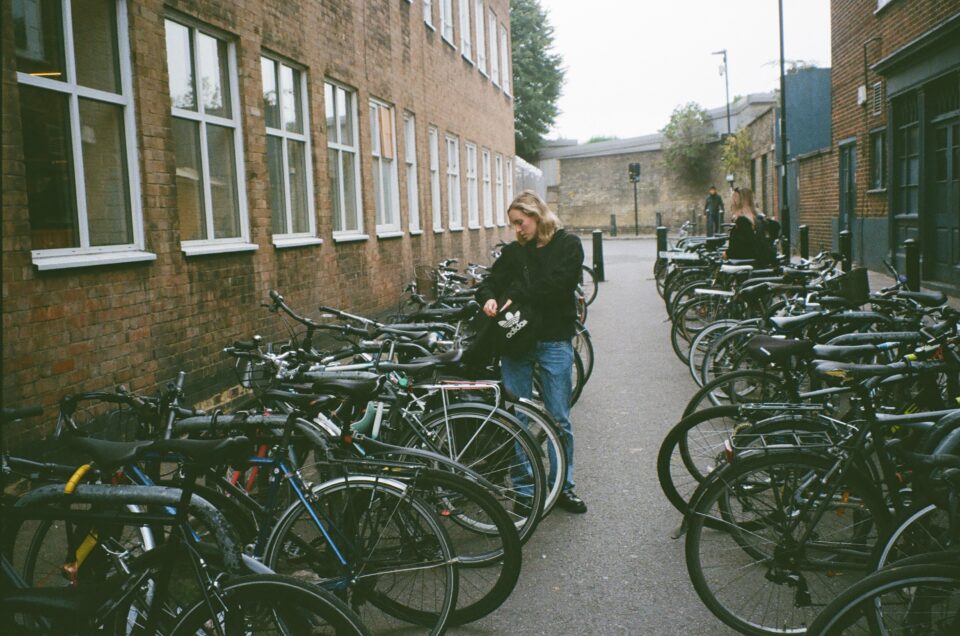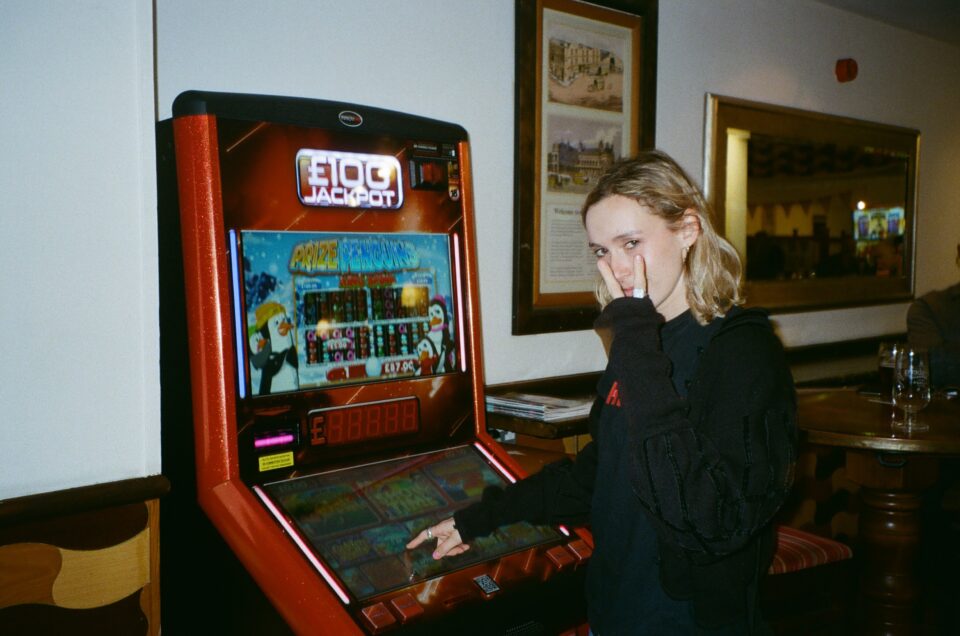I’m about to catch up with Asha Lorenz—one of the masterminds behind the London group Sorry alongside Louis O’Bryen, Lincoln Barrett, Campbell Baum, and Marco Pini—and I am panicking. Lorenz briefly has time to discuss the band’s sophomore album Anywhere But Here while I happen to be in London, and I have completely misjudged my ETA. For a moment I’m convinced I won’t make the interview, but Lorenz assures me she can meet me by a tube stop, sending me screenshots of the best route, punctuating her sentences with “No woz.” I spot her outside a bustling station near Dalston, circling on her bike in baggy blue jeans and a Chicago (the musical) t-shirt. She greets me with a hug, locks up her bike, and we head into the nearby Wetherspoons—a chaotic pub chain. Sitting down in a corner booth, one lyric from the album comes to mind: “There’s so many people that it drives me insane.”
While 925 was an apocalyptic daydream, Anywhere But Here is a thorny illustration of persisting through emotional fog. Their fever dream debut was built around cryptic lyricism and stark shifts mid-song; its dystopian surrealism fit well with the time of its release in March 2020. “One day we’re here / One day we die,” Lorenz posits among a dizzying guitar melody, right before sinister strings and industrial clangs rush in like a menacing storm on “In Unison.” 925 demonstrated the group’s hunger for catchy songwriting that protected a sense of the unexpected with each track. But their sophomore LP trades in the stream-of-conscious wordplay for exclamations of desire, vows of escapist protection, and earnest confusion surrounding human connection.

There’s a pungent stench of cynicism that wafts through these songs—the threat of being attacked by the concrete on “Step,” the pointless monotony of moving nowhere on “Closer,” the feelings of alienation howled through a downpour on “Screaming in the Rain.” But there’s something deeply comforting about the new album. Sorry implore us to dive into those heavy, uncomfortable emotions and come out the other side with some of the weight lifted. On “I Miss the Fool,” Lorenz realizes clinging to defensive fantasies doesn’t diminish the aching reality of loss. On “Step,” she visualizes songwriting as a key to survival: “I built a song for me and you to live in.” A subtle admittance of her faults coupled with the hypnotic chug of drums hints that something is around the bend waiting to take hold.
Lorenz leans forward intently listening to my questions, chewing the words over in her head. She squints off to the side for a few seconds before answering with toothy grins. Her responses are quick, ready to go to bat for the next one. Toward the end of our chat, she says something that adds a new light to some of the album’s dark words: “You just gotta go through the motions, bro,” she shrugs with a smile. “That’s what happens. You will go through them and you will get somewhere else.”
Read our conversation below in which Lorenz discusses how songs can create their own reality, what she tries to avoid when she’s writing music, and what she’s learned about love over the years.
It’s wild to think that your first album came out right at the beginning of the pandemic. Have you thought about how writing or making music has changed since then?
The process didn’t really change that much. We still write songs when they come, and usually start them in the bedroom or with Louis. It was more not touring. I thrive being around people, so not having that artistic letting go makes you go into yourself too much.
What were your intentions with an album this time around?
We wanted much more energy. That’s why we did it more live than 925, because I felt like the energy was a bit lost. It did naturally happen, but we wanted it to move in a different way. Sonically, we wanted it to sound older, but mixing in modern production. We were listening to a lot of ’70s music.
“Life is more digestible if I can make it into a song. It will come to fruition if you put it in a song, and it feels like it happened in your own way. It’s writing a waking dream. It’s another world that’s happening, but also not happening.”
How was the process of making Anywhere But Here different than that of 925?
925 was done over a much longer period of time, the actual recording. We kept going back into the songs and overdubbing. Lots of things are from loads of different places in terms of where they were recorded. We tried to not put things in from different places so that there was continuity in a song and things didn’t feel like they were from different gravities.
We wanted to record it backwards compared to the first album. In the first one we put in all the samples, trinkets, and details that make it our sound after. But this time we did that first so that we knew all the things that we’re putting in, and then we played it live so it sounded like it was really in the song.

The premise of living in a song, or protecting something in a song, seems to come up a few times. Where did that sentiment come from?
I process things or keep memories in songs. Life is more digestible if I can make it into a song. It will come to fruition if you put it in a song, and it feels like it happened in your own way. It’s writing a waking dream. It’s another world that’s happening, but also not happening. Then if you put a song out and the right person hears it, then maybe it is happening.
“I tried to use language throughout the whole album to be a bit more robotic and straightforward. Kind of childlike, like this animal that doesn’t really understand the things that humans do.”
What song do you associate the most with the past few years of your life?
“Screaming in the Rain.” It’s a bit more somber. Mostly I felt quite alienated. I tried to use language throughout the whole album to be a bit more robotic and straightforward. Kind of childlike, like this animal that doesn’t really understand the things that humans do; you can say it for what it is, but don’t know how to feel it.
Did you have specific musicians as influences?
I like Carly Simon and Randy Newman. I love Carole King as well. I like a good pop song—like Burt Bacharach. Those are the songs that melt my heart. I wanted to merge that with more modern production so that people won’t get bored listening to it. I think you have to find a good middle ground for kids—well, not kids, but younger generations. It’s like if you have a PS3 versus a PS4: If you’ve seen something better, even if it’s simpler, you can’t fuck with what’s come before if that’s all you know is what’s best. That’s the same with the sound on the radio. If you don’t know those old songs first, and you listen to a pop song now, it’s going to hit you in a way. You have to find a middle ground.
What do you try to avoid when you’re writing music?
I don’t do cheesy—I don’t like when you go on about something for too long and you’re not really saying anything. I think it’s best when there’s the most you can say in the smallest amount of words. I think it changes for each song. I think [cheesiness] gets inside of me, and Louis will always be like, “It’s not cheesy.” That’s why I always try to distort something that might be cheesy, trying to make it funny or a bit ironic. Maybe make it a bit off-kilter so it feels uneasy.
Is there something on the album that you’re specifically happy with?
I like “There’s So Many People That Want to Be Loved.” I felt happy about that. I knew that was a good song. But I’m not sure.
One that stands out for me is “Step.”
Really? That’s good, phew! We weren’t gonna put that one on. I wrote it from the perspective of someone who broke up with me, trying to work out why they did it.
“I always try to distort something that might be cheesy, trying to make it funny or a bit ironic. Maybe make it a bit off-kilter so it feels uneasy.”
There’s a line I love: “I still love you, whatever love means.” A lot of these songs deal with the complexity of love and understanding it.
Love is hard. The first relationship I had was really long and I was really heartbroken. Then I got into a new relationship. After the first breakup I felt I was never going to. I actually wrote those songs from that first breakup and I was in this other relationship and it ended at the end of this album. All the feelings that I felt in “I Miss the Fool” and “Step” that I felt for the person before, I felt them all again. I realized it’s not about a specific person, it’s the feeling we have between us. It kind of made me happy, and I feel like it came full-circle and made sense to me.
Did songwriting help you realize anything that you learned about love or relationships?
I read this quote like, “The magic or the illusion of first love is the illusion that it will always exist.” I gave that to the person that broke up with me and I framed it. But I didn’t really feel that yet. Then it happened when I had another breakup and, “Ah it is true!” The novelty of the breakup slowly wears off and now I feel sad about it. I have new things to explore where I know I’ll be sad about it, but it’s not the end of the world anymore. It’s weird that your mind does that. FL







